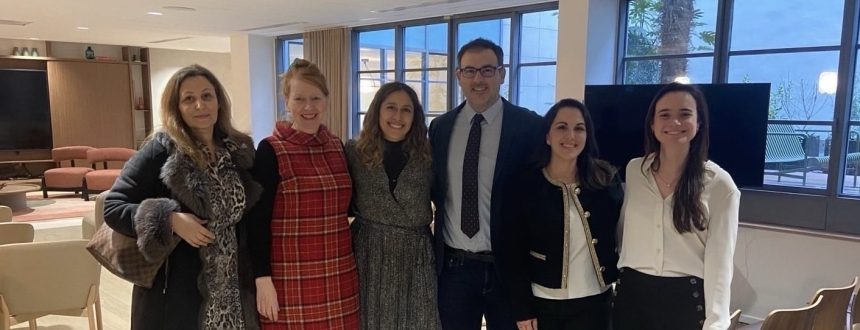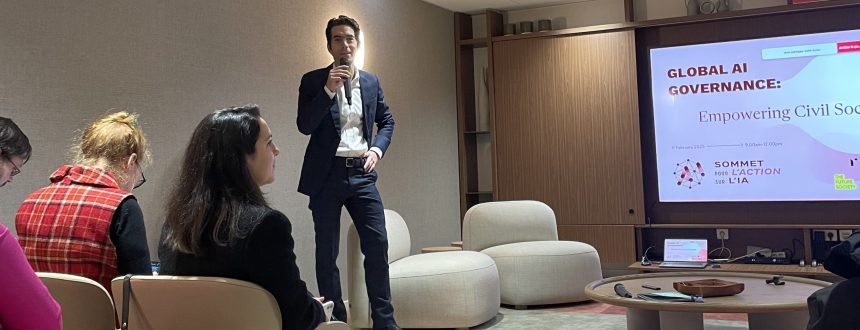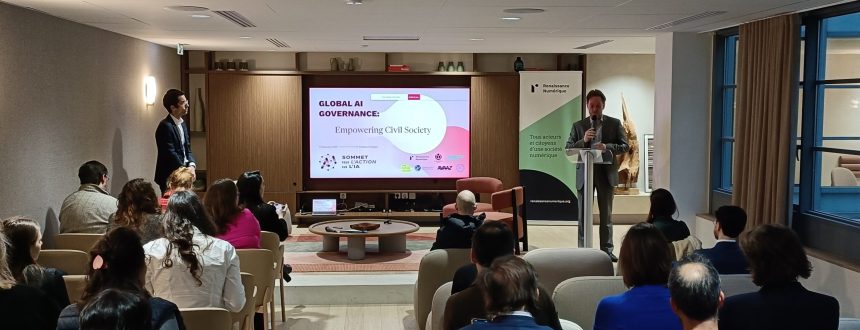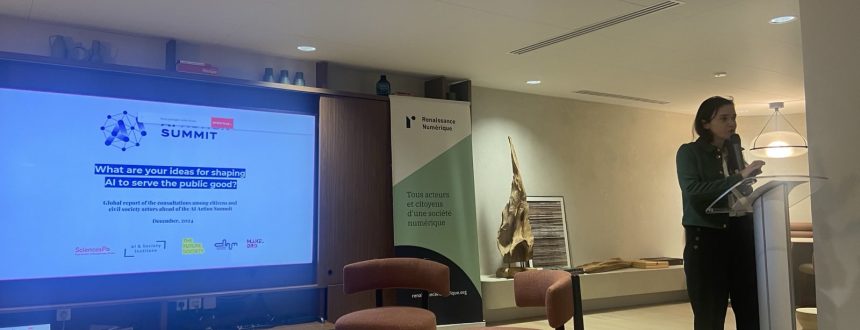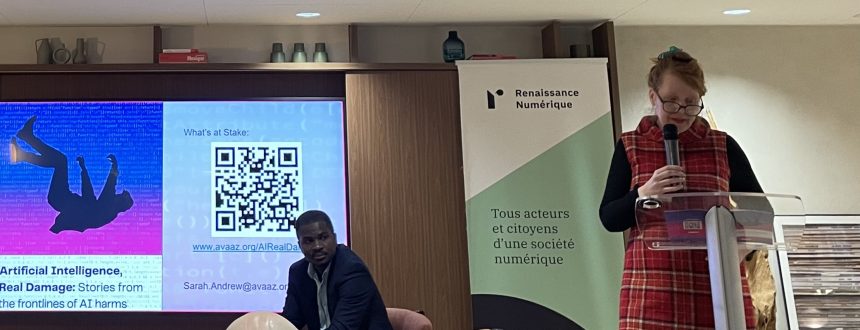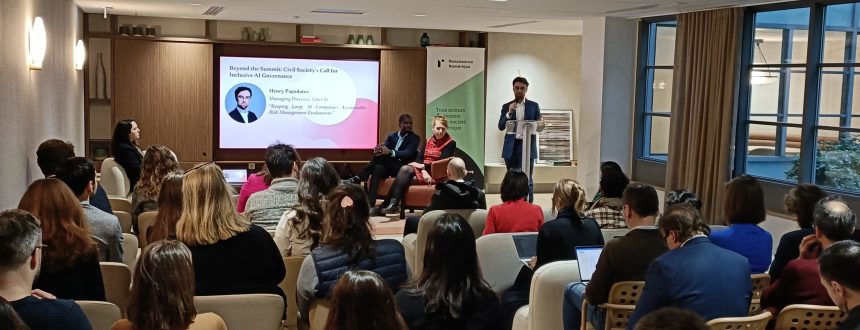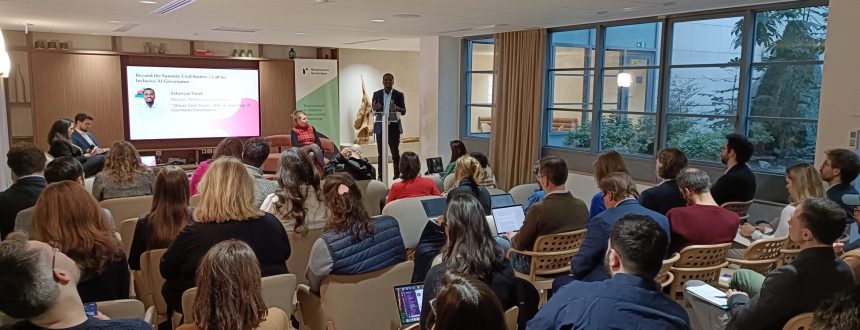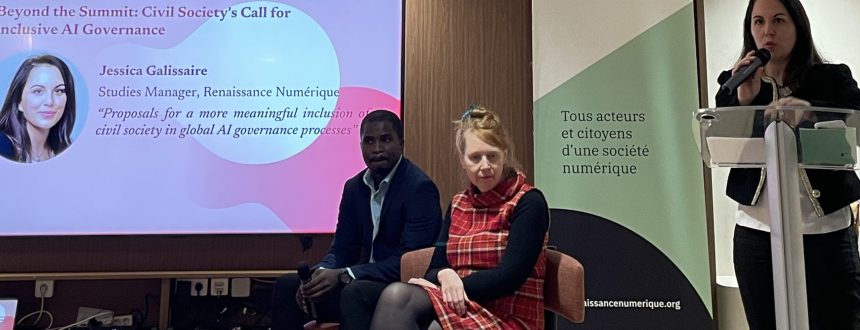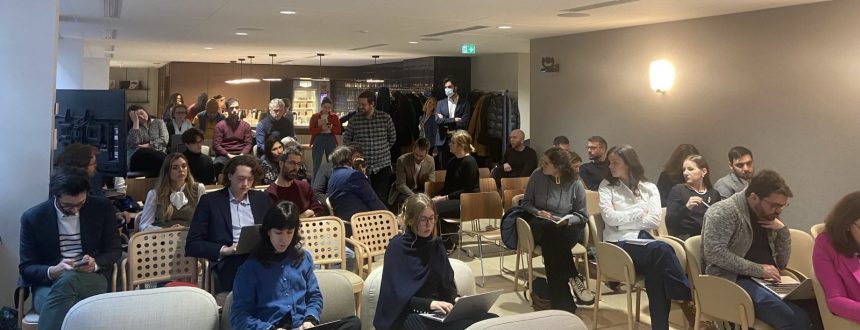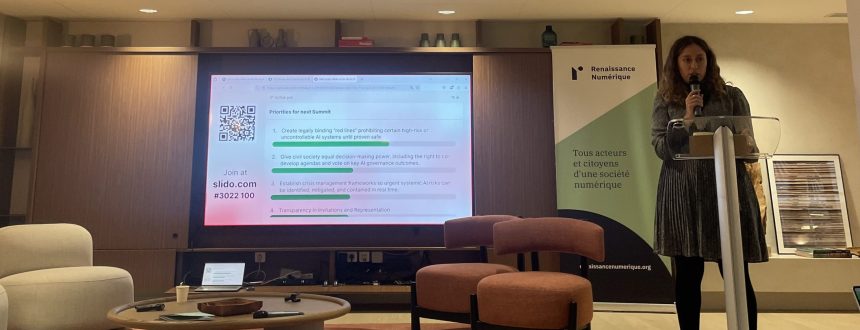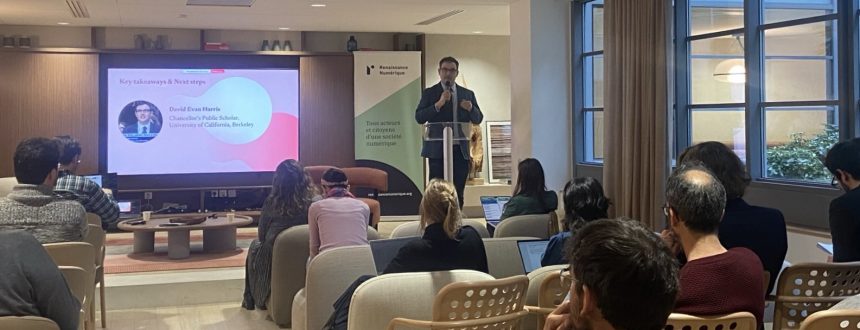News 14 February 2025
Renaissance Numérique at the AI Action Summit

Friday, 7th February
AI, citizens & democracy
To kick-off the AI Action Week, our General Manager, Jean-François Lucas, and Member of our Board Aude Schoentgen represented Renaissance Numérique at the event“IA : la voie citoyenne”(“AI: The Citizen Path”) organised by the French Economic, Social and Environmental Council (ESEC) and the National Digital Council. They attended debates on how to make AI more democratic, and what’s missing to improve citizen inclusion around key choices and discussions on AI developments, in the presence of Clara Chappaz, Minister Delegate for artificial intelligence and digital technologies. The event showcased three recent opinions adopted by ESEC on general interest AI, AI, employment and labour, and the risks and opportunities of AI for the environment.
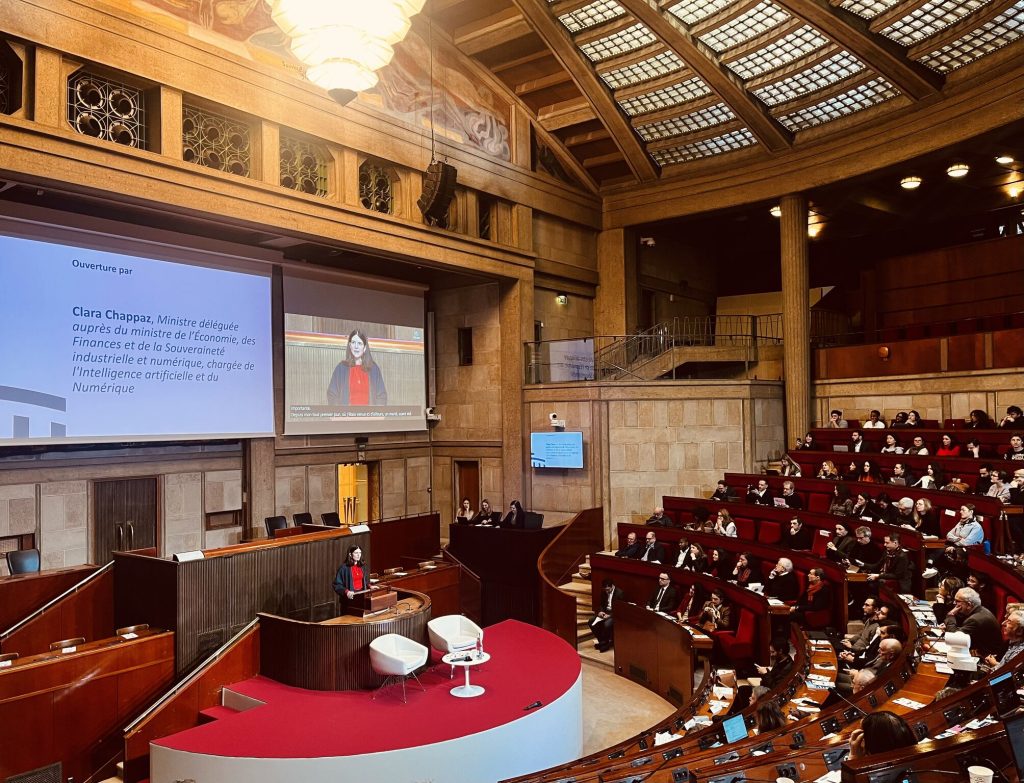
Replay
AI: an existential threat?
In the afternoon, our General Manager, Jean-François Lucas, shared key insights during a high-level conference at Rencontres des Sablons with Yannick Bardie, Director of the Science and Society Observatory of Institut Sapiens. Is AI causing an existential threat? “Yes and no, but mostly no” is his short answer. For the long answer and to dig deeper into the topic, understand what is AI and what it’s not, its potential impact on labour, reflections about agentic or general AI, check out the recording of the discussion below (in French only).
REPLAY
Monday, 10th February

AI literacy under the EU AI Act
On Monday, 10th February, while Renaissance Numérique’s President, Samuel Le Goff, represented the think tank at the official gathering at Grand Palais, our General Manager, Jean-François Lucas, attended the event “Implementing AI Literacy at AI Action Summit”. Organised by the International Association of Privacy Professionals (IAPP) and hosted by Hogan Lovells, this discussion brought together leading AI experts from companies developing and deploying AI systems, to address the requirement, under the EU AI Act, for these companies to ensure a sufficient level of AI literacy. What does this requirement precisely mean? What is acceptable to demonstrate compliance? Who will be in charge of enforcement? Will AI literacy be a requirement outside of the EU? These questions were at the heart of the debate moderated by Etienne Drouard, Partner at Hogan Lovells and Member of Renaissance Numérique’s Board.
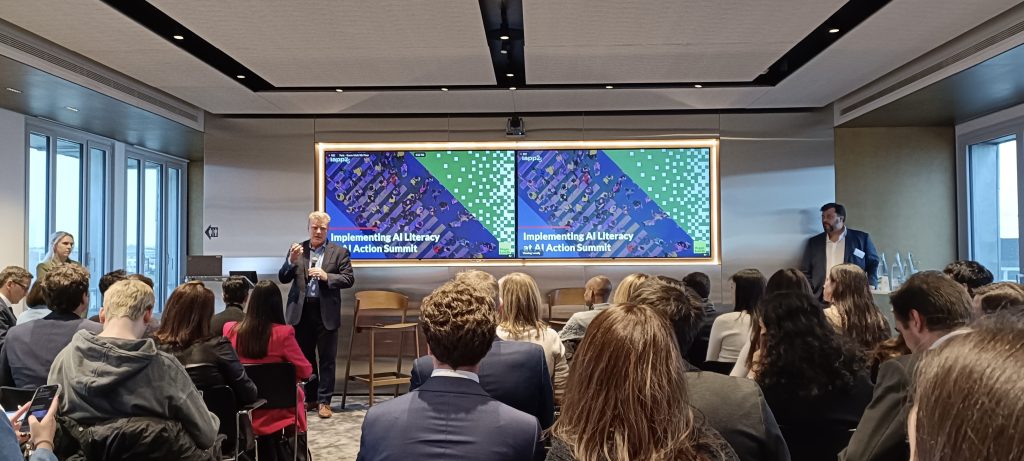
Tuesday, 11th February
No less than 70 side-events were organised on the official second day of the Summit. Renaissance Numérique was present at 5 and organised 2.
Strategic autonomy
Our Member Cédric Bellenger, Director General of DAC France, took part in the conference “Empowering AI Ecosystems through Strategic Autonomy: Lessons from Finland and France”, organised at the Finnish Embassy in Paris. This event showcased keynote addresses by Finland’s Prime Minister Petteri Orp, Audrey Plonk, Deputy Director of the Science, Tech and Innovation Directorate at the OECD, Nicolas Miailhe, Co-Founder & CEO of PRISM Eval, Petri Myllymäki, Director of the Helsinki Institute for Information Technology (HIIT) and Frédéric Pascal, Coordinator of AI activities at CentraleSupelec and Director of the DATAIA Institute. They addressed Europe’s strategic autonomy when it comes to AI, and the importance of developing a Digital Single Market, especially a descent market for companies.
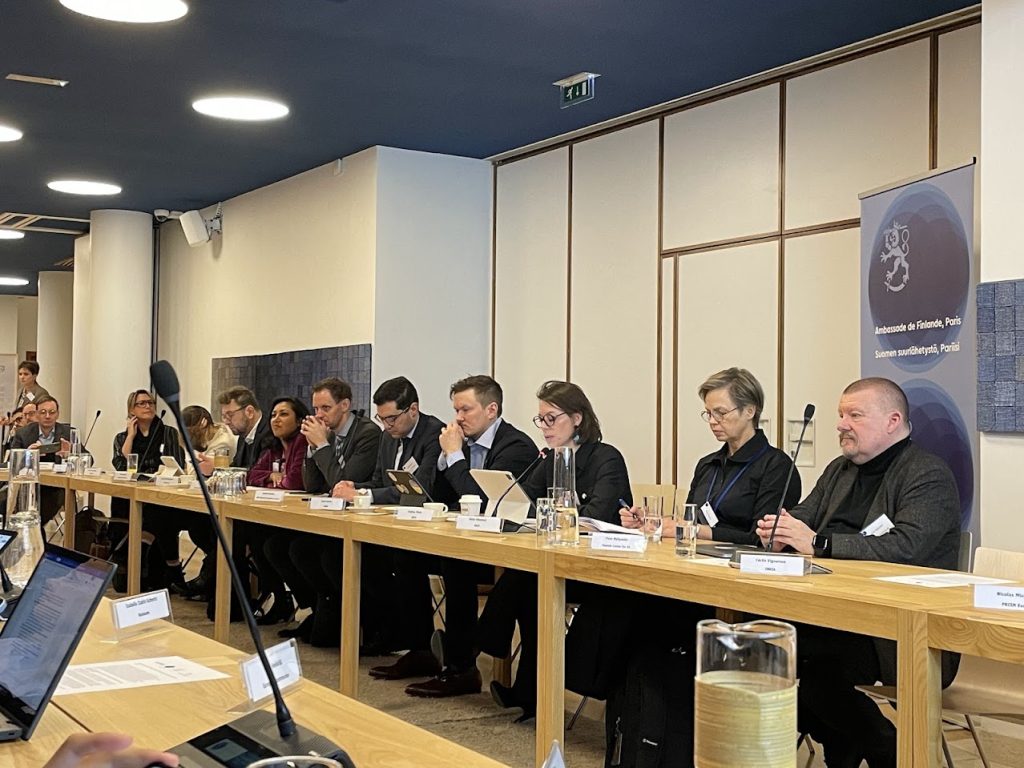
Business day & AI economics
That same day, our President, Samuel Le Goff, was invited to take part in the Summit’s Business Day organised by France Digitale at Station F, while Aude Schoentgen Member of Renaissance Numérique’s board attended the event “AI Economics” organised by OpenAI, also at Station F. It showcased remarks by Chris Lehane, Chief Global Affairs Officer at OpenAI and Ronnie Chatterji, Chief Economist of OpenAI, and a discussion on AI-driven economy, infrastructure and energy. Astrid Panosyan-Bouvet, French Minister for Labour and Employment, closed the event with concluding words.
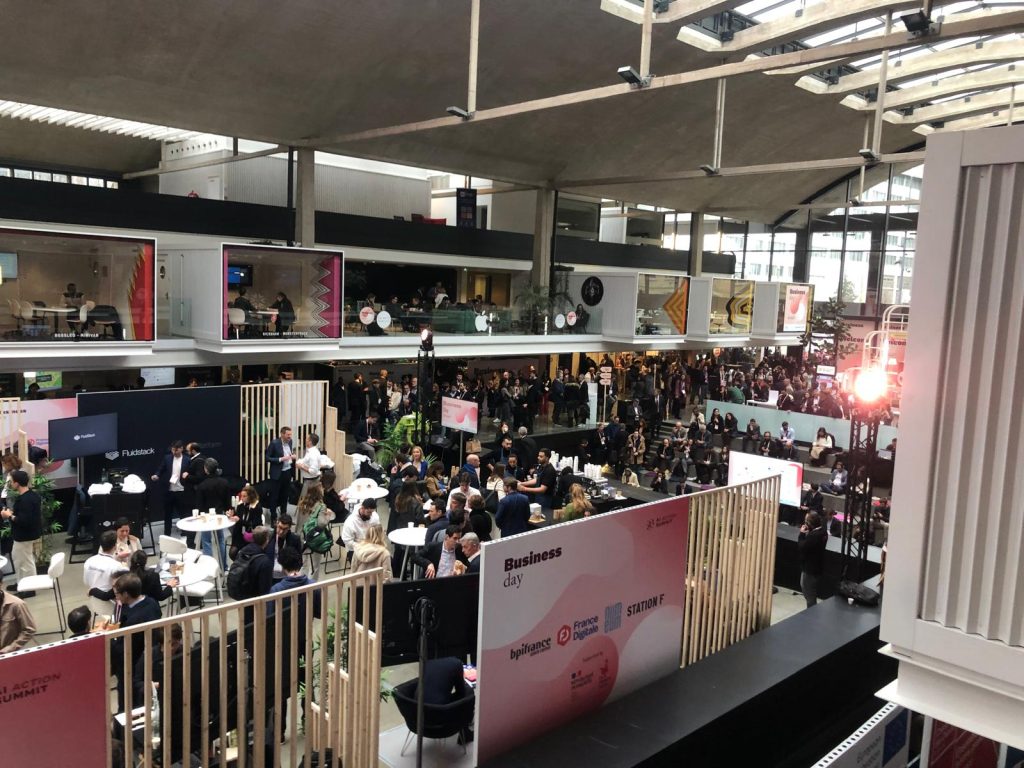
Renaissance Numérique organised two major events that day.
Civil society & the global governance of AI
In the morning, in partnership with The Future Society, Wikimedia France, the Avaaz Foundation, Connected by Data, Digihumanism and the European Center for Non-for-Profit Law, the think tank gathered close to 100 experts for the official side-event “Global AI Governance: Empowering Civil Society”. After opening remarks by Renaissance Numérique’s President, Samuel Le Goff, and Charles Bouffier, Partner at Racine Avocats and Member of the think tank, Caroline Jeanmaire, Senior Associate in AI Governance at The Future Society, presented the results of experts and citizens consultations organised ahead of the Summit. Two words can summarise what both citizens and experts expect from governments and companies when it comes to AI: constructive vigilance. To launch the discussion on how to better and more meaningfully include civil society in the global governance of AI, two panelists shared their views on why it is important for civil society to take part in these efforts, and how it may do so. Sarah Andrew, Legal and Campaign Director of the Avaaz Foundation, shared very concrete real-life stories on how AI may harm citizens, while Henry Papadatos, Managing Director of SaferAI, shared insights on how to keep large AI companies accountable through risk management evaluations. Zakariyau Yusuf, Director of the Tech Governance Project, then provided food for thought on African civil society’s role in supporting AI governance coordination. Jessica Galissaire, our Studies & Partnerships Manager, presented the call to action initiated by Renaissance Numérique and now signed by over 80 experts, which includes three concrete measures for a more meaningful inclusion of civil society in global AI governance efforts.
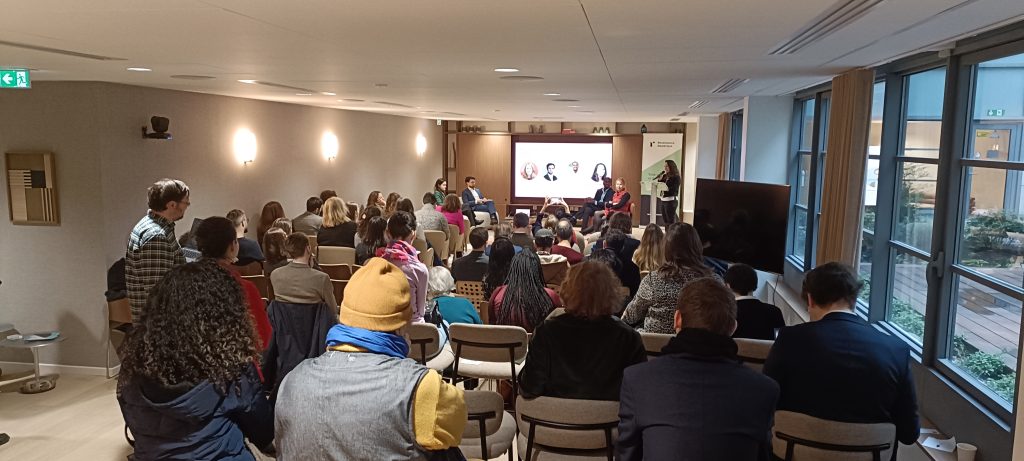
In a session moderated by Karine Caunes, Executive Director of Digihumanism, and Tim Davies, Research Director at Connected by Data, participants both in the room and online were invited to take part in an ideation exercise, with the aim of creating a “Civil Society Wish List for Improved AI Governance”, to be published soon and which will be widely shared publicly, to the press and to the organisers of the next AI Summit. Close to 100 experts took part in this process.
To close this extremely participative and lively session, Laura Lázaro Cabrera, Counsel and Programme Director for Equity and Data at the Centre for Democracy & Technology (CDT) Europe, delivered concluding remarks. David Evan Harris, Chancellor’s Public Scholar at the University of California, Berkeley, closed the event with an inspiring keynote address.
This event was hosted and supported by Racine Avocats.
AI science & evaluation: learning from high-stakes industries & technologies
When it comes to AI evaluation, transparency and accountability, what lessons can we learn from other high-stakes industries and technologies like aviation, nuclear energy or genome editing, which have long grappled with measuring and managing complex risks? This was the central theme of a high level discussion organised by Renaissance Numérique in partnership with think tank Impact AI in the evening of that same day. Mahasti Razavi, Managing Partner at August Debouzy, opened the event with introductory remarks, followed by a keynote address from former French Prime Minister Bernard Cazeneuve.
Yoshua Bengio, Professor at the University of Montreal and world-renowned deep learning pioneer, then presented the International AI Safety Report 2025, which he recently directed for the UK AI Safety Institute.

Digging deeper into the topic of the event, our Vice-President, Annabelle Richard, moderated a fascinating panel discussion gathering Natasha Crampton, Chief Responsible AI Officer at Microsoft, Rebecca Finlay, CEO of Partnership on AI, Audrey Plonk, Deputy Director of the Science, Tech and Innovation Directorate at the OECD and Denise Wong, Director of Singapore’s AI Safety Institute.
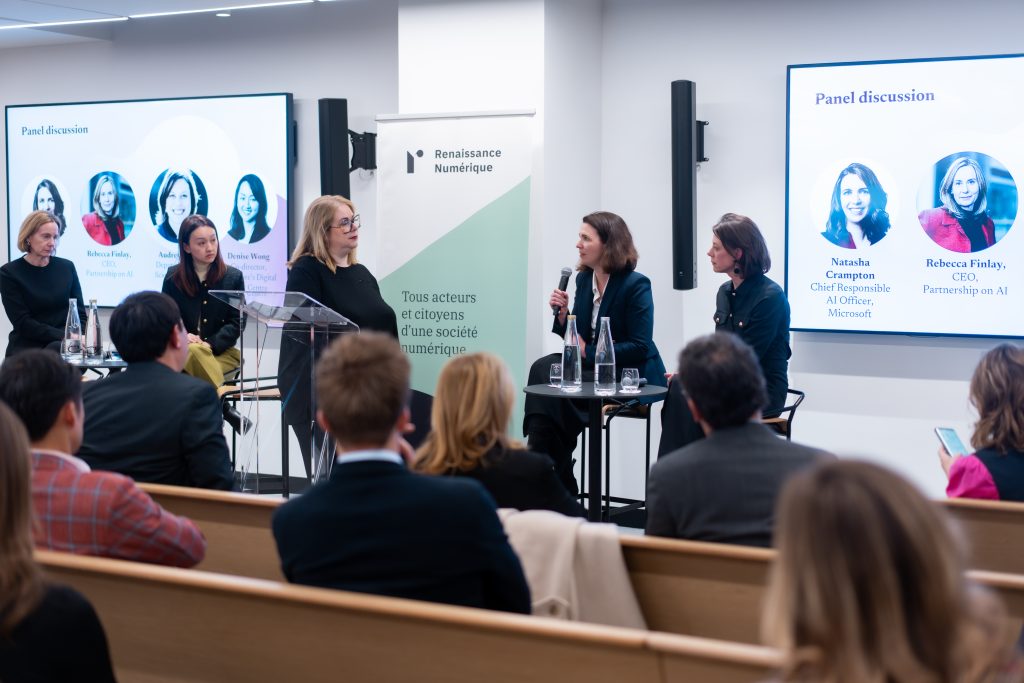
A short paper summarising the discussion will be released soon. This side-event was hosted by August Debouzy.
REPLAY
Tuesday, 12th February
Recovery brunch with civil society
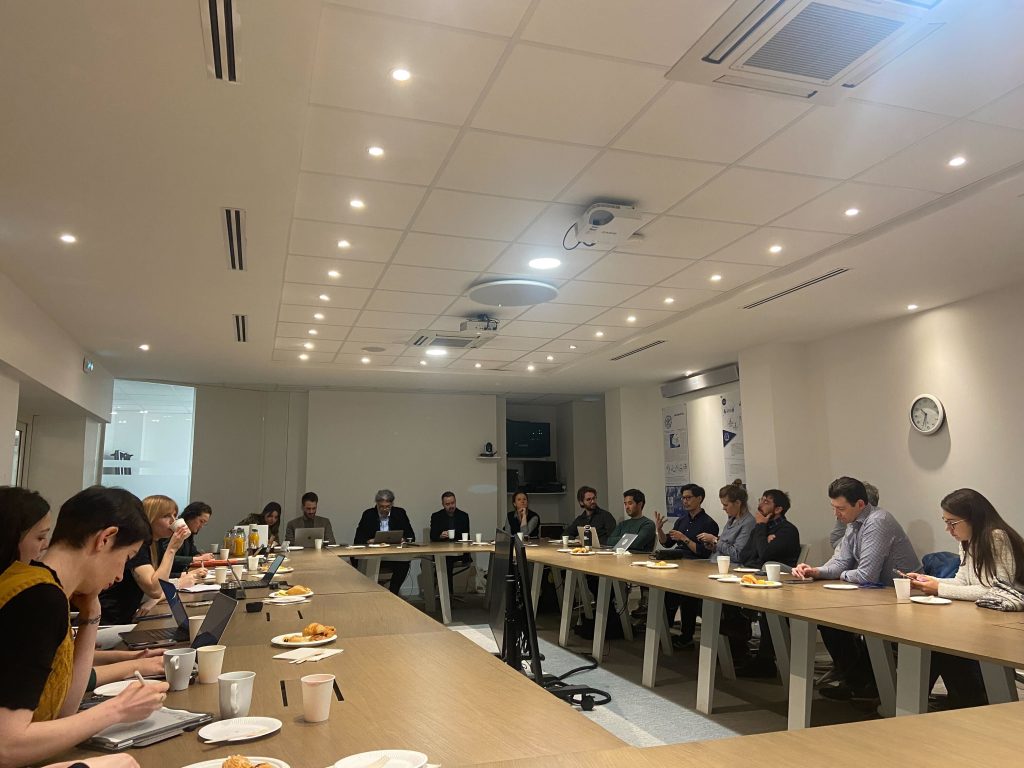
Building on the momentum from the previous day, our Studies & Partnerships Manager, Jessica Galissaire, and Board Member Aude Schoentgen joined around 30 other civil society experts for a “Recovery Brunch” organised by the Ada Lovelace Institute and the AI & Society Institute. Participants shared feedback and insights from the Summit and discussed how to collaborate in the future to be collectively more efficient in making civil society’s voice heard. Key actions are planned in this regard, and all the actors who joined are invited to contribute to the wish list that was discussed at the civil society event of 11th February.
Oversight Board Lunch
Ending the AI Action week on a convivial note, our Studies & Partnerships Manager, Jessica Galissaire, was invited by the Oversight Board to an informal lunch with disinformation and online public space specialists, in the presence of Oversight Board Members Julie Owono, lawyer and executive director of Internet Sans Frontières and Nighat Dad, lawyer and internet activist.
-
Event
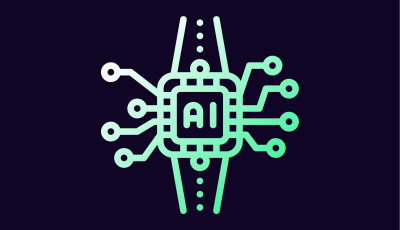
AI Evaluation & Learning from High-Stakes Industries & Technologies
Tuesday 11th February 2025, from 5:30pm to 7:30 pm
By invitation only, Paris
-
Event
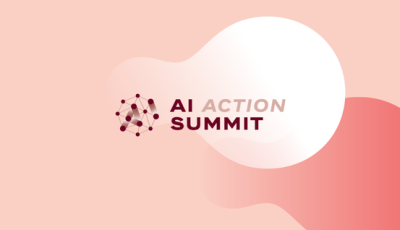
Global AI Governance: Empowering Civil Society
Tuesday 11th February 2025, from 9.00am to 12.00
Racine Avocats, 40 rue de Courcelles, 75008 Paris
-
News 5 February 2025


